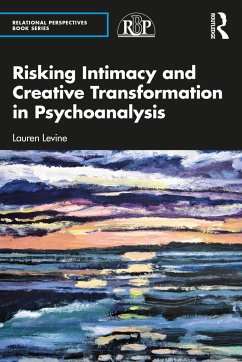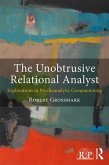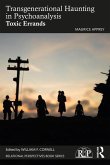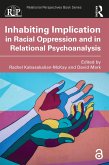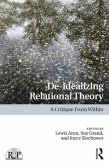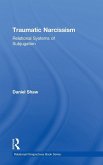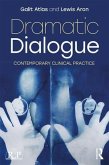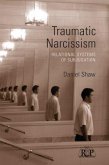In this compelling book, Lauren Levine explores the transformative power of stories and storytelling in psychoanalysis to heal psychic wounds and create shared symbolic meaning and coherence out of ungrieved loss and trauma.
Through evocative clinical stories, Levine considers the impact of trauma and creativity on the challenge of creating one's own story, resonant with personal authenticity and a shared sense of culture and history. Levine sees creativity as an essential aspect of aliveness, and as transformative, emergent in the clinical process. She utilizes film, dance, poetry, literature, and dreams as creative frames to explore diverse aspects of psychoanalytic process. As a psychoanalyst and writer, Levine is interested in the stories we tell, individually and collectively, as well as what gets disavowed and dissociated by experiences of relational, intergenerational, and sociopolitical trauma. She is concerned too with whose stories get told and whose get erased, silenced, and marginalized. This crucial question, what gets left out of the narrative, and the potential for an intimate psychoanalytic process to help patients reclaim what has been lost, is at the heart of this volume.
Attentive to the work of helping patients reclaim their memory and creative agency, his book will prove invaluable for psychoanalysts and psychotherapists in practice and in training.
Through evocative clinical stories, Levine considers the impact of trauma and creativity on the challenge of creating one's own story, resonant with personal authenticity and a shared sense of culture and history. Levine sees creativity as an essential aspect of aliveness, and as transformative, emergent in the clinical process. She utilizes film, dance, poetry, literature, and dreams as creative frames to explore diverse aspects of psychoanalytic process. As a psychoanalyst and writer, Levine is interested in the stories we tell, individually and collectively, as well as what gets disavowed and dissociated by experiences of relational, intergenerational, and sociopolitical trauma. She is concerned too with whose stories get told and whose get erased, silenced, and marginalized. This crucial question, what gets left out of the narrative, and the potential for an intimate psychoanalytic process to help patients reclaim what has been lost, is at the heart of this volume.
Attentive to the work of helping patients reclaim their memory and creative agency, his book will prove invaluable for psychoanalysts and psychotherapists in practice and in training.
'In this exquisite new book, Lauren Levine captures the finely nuanced tapestry that emerges when an analytic dyad takes shape; the interweaving of two different narratives of self that come together, engage with each other, distance each other and ultimately form the subject matter of the analysis that unfolds. With brilliant clarity, and detailed and forthrightly honest clinical examples, Levine demonstrates how the collision of the patient's and the analyst's preferred life stories demands the analyst's, at times painful emotional honesty, in re-opening dissociated pockets of enlivening engagement and creativity.'
Jody Messler Davies, NYU Post-Doctoral Program, Stephen Mitchell Center for Relational Studies
'In this powerful and creative volume, Risking Intimacy and Creative Transformation in Psychoanalysis, Lauren Levine explores the healing power of stories as they touch our vulnerabilities, our strengths and resilience, intrapsychic and sociocultural traumas. Levine beautifully explores the transformative value of sharing our stories with a listening, witnessing other, bearing witness to our wounds, our shame, and our collective sins.'
Galit Atlas, author of Emotional Inheritance; faculty, NYU Postdoctoral Program in Psychoanalysis
'Risking Intimacy and Creative Transformation in Psychoanalysis is a wonder, a collection of essays whose honesty, integrity and authenticity challenge us and teach us, making us more vulnerable and hence more alive than we were before reading. It provides a relational blueprint to the intricacies of our deepest fears and fantasies about the psychoanalytic process as well as an openness to the insidious impact of racism and sociopolitical trauma. It is extremely rare that such a broad range of the human experience is taken on by any author; it is a rarity indeed for it to be done with such brilliance, thoughtfulness and creative care. This is a most welcome addition to our libraries and should be read and re-read for the often painful aliveness it brings to the therapeutic encounter.'
Steve Tuber, author of Attachment, Play and Authenticity: Winnicott in Clinical Context
'In this moving and incisive work, Lauren Levine reminds us that storytelling has both dangerous and curative dimensions. We often use stories to evade our own traumas and hide from self-awareness of the gaps in our personal narratives. This has also been true of the field, in terms of the stories psychoanalysts feel comfortable engaging in our various models of the psyche. With an emphasis on the sharing of stories as the key to transformative mental healing, Risking Intimacy and Creative Transformation offers a powerful introduction to the insights of a relational psychoanalysis that can address the racial and cultural traumas of the 21st century.'
Michelle Stephens, founding executive director, Institute for the Study of Global Racial Justice, professor of English and Latino and Caribbean Studies, Rutgers University
'Lauren Levine explores the creative potential of what might be called story living. She captures how shared stories build relational and political transformations. But only, as Levine carefully details, when patient and analyst together confront personal inhibitions and cultural prohibitions that render stories normotic and deadening. Levine theorizes and clinically animates the ways in which we not only "tell ourselves stories in order to live," as per Didion, but also how we tell stories to change the order of living.'
Ken Corbett, clinical assistant professor at the NYU Postdoctoral Program in Psychoanalysis and Psychotherapy
'Lauren Levine's highly creative work, Risking Intimacy and Creative Transformation in Psychoanalysis, marks the evolution of relational theory as a space of increasingly wonderful complexity. Her clinical and theoretical approach stresses the role of imagination and novel forms of clinical interaction. In this work, weaving film, poetry and dance into compelling psychoanalytic stories, we see both clinical and theoretical movement and expansion.'
Adrienne Harris, faculty, NYU Postdoctoral Program in Psychoanalysis and New School for Social Research
Jody Messler Davies, NYU Post-Doctoral Program, Stephen Mitchell Center for Relational Studies
'In this powerful and creative volume, Risking Intimacy and Creative Transformation in Psychoanalysis, Lauren Levine explores the healing power of stories as they touch our vulnerabilities, our strengths and resilience, intrapsychic and sociocultural traumas. Levine beautifully explores the transformative value of sharing our stories with a listening, witnessing other, bearing witness to our wounds, our shame, and our collective sins.'
Galit Atlas, author of Emotional Inheritance; faculty, NYU Postdoctoral Program in Psychoanalysis
'Risking Intimacy and Creative Transformation in Psychoanalysis is a wonder, a collection of essays whose honesty, integrity and authenticity challenge us and teach us, making us more vulnerable and hence more alive than we were before reading. It provides a relational blueprint to the intricacies of our deepest fears and fantasies about the psychoanalytic process as well as an openness to the insidious impact of racism and sociopolitical trauma. It is extremely rare that such a broad range of the human experience is taken on by any author; it is a rarity indeed for it to be done with such brilliance, thoughtfulness and creative care. This is a most welcome addition to our libraries and should be read and re-read for the often painful aliveness it brings to the therapeutic encounter.'
Steve Tuber, author of Attachment, Play and Authenticity: Winnicott in Clinical Context
'In this moving and incisive work, Lauren Levine reminds us that storytelling has both dangerous and curative dimensions. We often use stories to evade our own traumas and hide from self-awareness of the gaps in our personal narratives. This has also been true of the field, in terms of the stories psychoanalysts feel comfortable engaging in our various models of the psyche. With an emphasis on the sharing of stories as the key to transformative mental healing, Risking Intimacy and Creative Transformation offers a powerful introduction to the insights of a relational psychoanalysis that can address the racial and cultural traumas of the 21st century.'
Michelle Stephens, founding executive director, Institute for the Study of Global Racial Justice, professor of English and Latino and Caribbean Studies, Rutgers University
'Lauren Levine explores the creative potential of what might be called story living. She captures how shared stories build relational and political transformations. But only, as Levine carefully details, when patient and analyst together confront personal inhibitions and cultural prohibitions that render stories normotic and deadening. Levine theorizes and clinically animates the ways in which we not only "tell ourselves stories in order to live," as per Didion, but also how we tell stories to change the order of living.'
Ken Corbett, clinical assistant professor at the NYU Postdoctoral Program in Psychoanalysis and Psychotherapy
'Lauren Levine's highly creative work, Risking Intimacy and Creative Transformation in Psychoanalysis, marks the evolution of relational theory as a space of increasingly wonderful complexity. Her clinical and theoretical approach stresses the role of imagination and novel forms of clinical interaction. In this work, weaving film, poetry and dance into compelling psychoanalytic stories, we see both clinical and theoretical movement and expansion.'
Adrienne Harris, faculty, NYU Postdoctoral Program in Psychoanalysis and New School for Social Research

